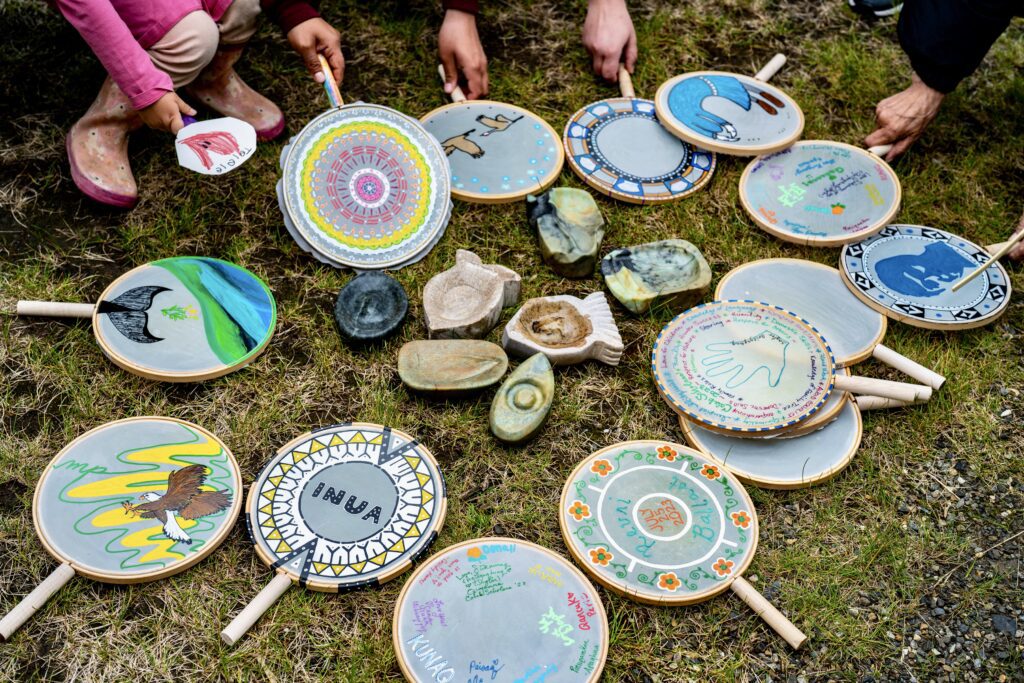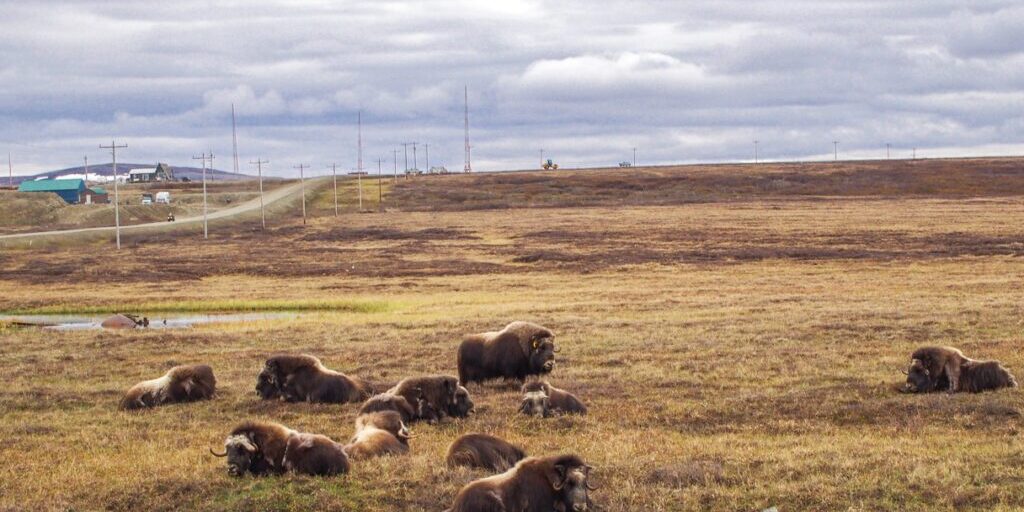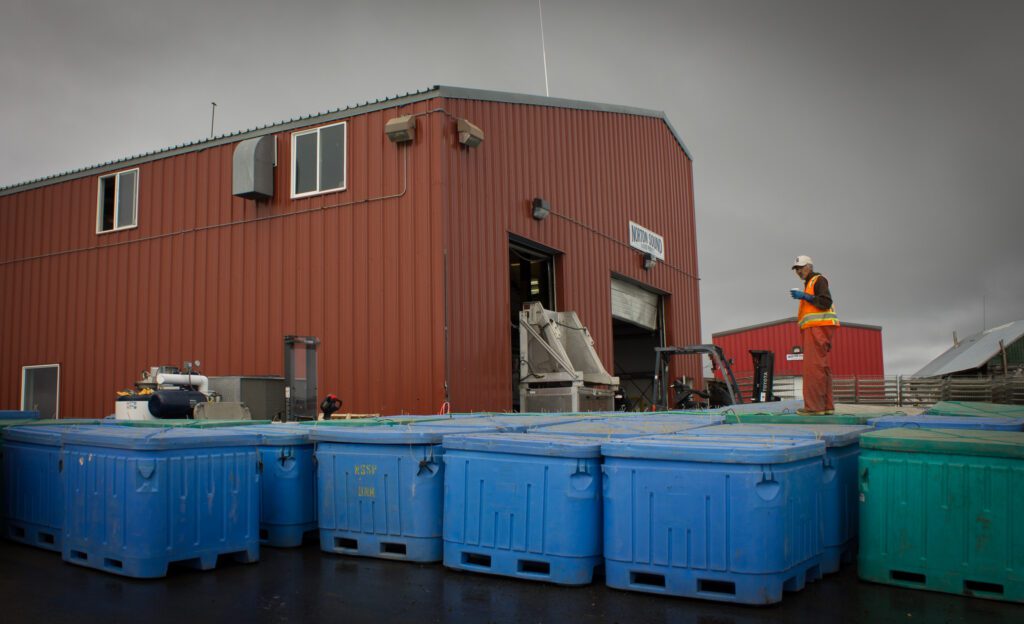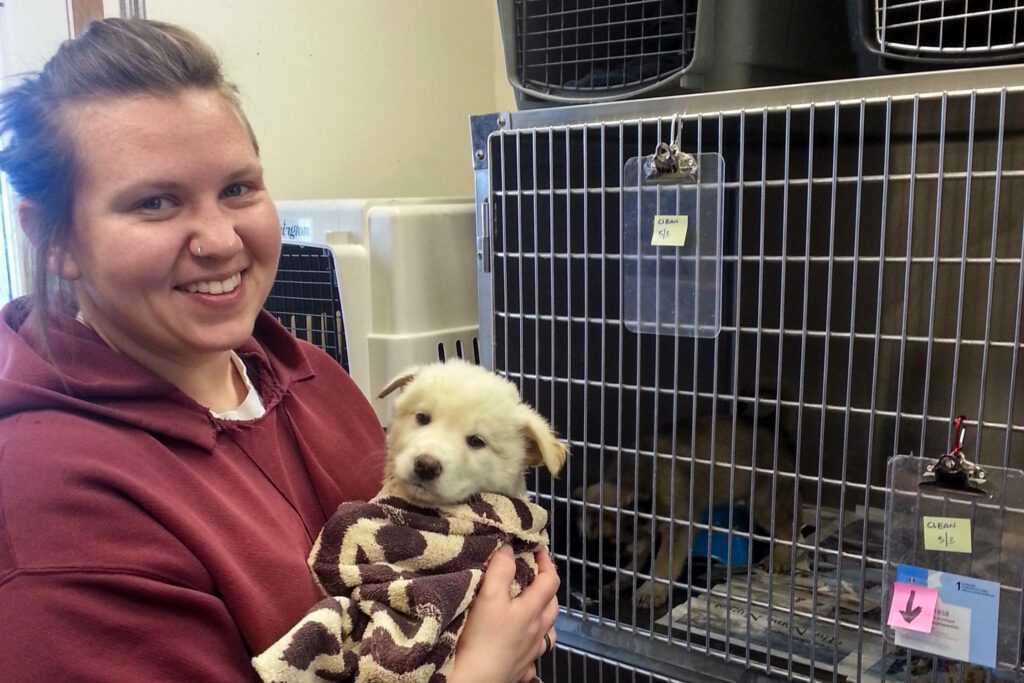If you’ve been having problems with all the musk ox near town, lately—you’re not alone.
“I open the door and heard this bang, bang, bang, and I thought, ‘What’s my 12-year-old up to now?’”
Vicky Erickson has lived in Nome for more than 20 years, and had her first run in with some musk ox last week behind her home in Icy View.
“And I see my husband is back up against a Connex waving a shovel around at these two huge musk ox. Each of them was on the opposite side of our dog pen, and they were ramming the dog pen. And I thought, ‘Oh my god, this doesn’t look good.’”
Erickson was terrified for her husband, Mitch. And though you’re legally allowed to shoot a musk ox in defense of life and property—DLP—she hadn’t fired a gun in years. So, to chase the two bulls away, she used the next best thing: her red Ford F-150.
“And I just faced off with the one who was causing the most havoc with the dog pen, and I just laid on my horn, and I did a ‘brody,’ and I went right at him. And he kinda stopped and looked at me, and kinda squared off like he was gonna challenge me, and I said ‘Go ‘head’ and I laid into the pick up, and he turned and ran.”
But, then, there was still another bull to deal with.
“And then Mitch was yelling at me and I turn and here comes the other one towards the door of the pick-up. And I thought ‘Bring it on!’ And so I put it in reverse and I went for him and he fell! The musk ox fell right in front of me, right on his face. And then he turned off and ran.”
The couple were physically fine, but when I talked to Erickson last week, she was still a little shaken by it all; less from the attack itself, than from a new feeling that, now, she has to be on guard all the time in case her dog, or, even worse, her kids get in a tangle with a musk ox. Especially now that herds seem to be hanging closer to town.
“Everywhere I’m running into musk ox. In the bushes, on the road,” said Mercie McGuffie, who grew up in Nome, and used to have to get out into country for any shot at spotting musk ox. And the herds seemed smaller, back then, too.
McGuffie thinks that more brown bears in the area are pushing the animals closer to town, which bears have mostly learned to steer clear of. Humans, in the estimation of a musk ox, seem to be a safer bet than bears. But they don’t feel the same way about dogs.
“My boss’s dog was actually kind of gored by the horns of the musk ox. And so one of—one of his dogs passed,” McGuffie said of an incident that happened the first week of June. Since then there have been plenty of stories about musk ox going after dogs.
“They do hate dogs because they’re hardwired for wolves, to protect their young or what-not,” Erickson said, offering a common explanations from around town for why the otherwise sedate musk ox go so crazy around pets.
But I needed to find out more about the musk ox—about their attitudes and ways. So I went to the man I knew would have answers, an expert on how they think, and why.
“Well, musk ox are incredibly patient with people,” explained Tony Gorn, Department of Fish and Game’s biologist in the area around Nome, and as such, a de facto expert on the relatively abundant musk ox herds inhabiting the Seward Peninsula.
Gorn said that although there are definitely more musk ox around town lately, that doesn’t mean there are necessarily more overall.
“Well, when we look at the Seward Peninsula musk ox population in its totality, the population is actually declining pretty rapidly. It’s declining 13% annually. What’s really changed in the last several years is the distribution of the local musk ox groups.”
Although Fish and Game hasn’t yet collected the hard data and statistical evidence they rely on to fully understand wildlife events, Gorn thinks the brown bear hypothesis is compelling. Especially after since seeing results from a colleague’s survey on calving.
“At the same time calves were disappearing, that was the same time period that all the musk ox moved into Nome,” Gorn summarized. “So, if you connect those dots it certainly does seem like the local movements towards Nome are really in response to predation.”
As for the dogs, Gorn gets reports every year of incidents—some deadly—but he’s also seen plenty of times when musk ox have behaved more or less indifferently towards barking, excitable dogs. He believes instead of being hardwired to go into attack mode whenever there’s a bark, there may be something else going on with the older bulls.
“The more interactions I see between musk ox and dogs, I just can’t help but wonder if musk ox, when they get older, lose their hearing or their eye-sight.”
A lot of the time when the musk ox have lashed out it’s been a defensive reaction, not a predatory attack, Gorn explained. Almost like they didn’t see or hear the dogs until they were so close they got spooked, and then scrambled to fend off an attack. Even if it’s from a dachshund or a labradoodle.
The accusations of dog-aggression might also be an observation bias. Reports to Fish and Game, as well as stories that circulate around town, are about incidents that went wrong. But benign, seemingly unremarkable interactions, like a dog barking at a herd then nothing happening, don’t get repeated. So the evidence that accrues tends to be about when things went wrong, even though that might just be one part of a larger story.
All of which may seem like splitting hairs if it was your dog that got attacked.
Gorn advises that one of the best measures to prevent pets from assaults is trimming willows in order to increase visibility, and getting chain-link kennels, which tend to hold up the best if they’re rammed head-on by bulls.
However, there’s only so much that can be done—even by the professionals. Gorn and others at Fish and Game respond to wildlife calls at all hours of the day and night, chasing musk ox herds away from the airport and people’s homes. At a certain point though, you’ve got to ask how much of the annoyance and potential risk is just par for the course if you live in a wild place?
“But yet I do love the musk ox, I don’t want anyone to think I don’t love ‘em and think they’re very unique and very cool animals—because I do. And I know they’re just being wild animals,” Erickson said after admitting she’s not sure what the best solution is for the recent musk ox woes.
“Somewhere in there, we got to figure it out how we can live with them. But, push comes to shove, my kids come first, and most certainly my spouse and my dog and my red F-150 that I love,” she laughed.
And even if there is no clear-cut answer for how to balance the allure of local wildlife with the security of town-life, there is one piece of musk ox advice that Gorn is unequivocal about: never try to adopt a baby ox.
“Do not pick up that calf,” Gorn said sternly. “Because like I said, the minute you do you pick it up, you basically just killed that thing.”
And in general, if you see a musk ox or a herd, just try to keep your distance, don’t bother them, and maybe look around for the nearest F-150.







